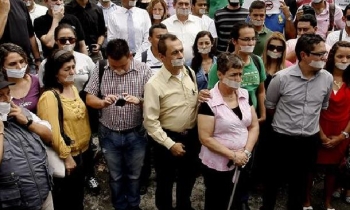International pressure is mounting on the Afghan authorities over the arrest of two journalists accused of defaming Islam in the country.
Both the United Nations and Reporters Without Borders have voiced concerns about the Kabul supreme court's order to close the weekly Afghan newspaper Aftab and arrest its editor, Sayeed Mirhassan Mahdawi, and his Iranian deputy on counts of blasphemy.
A column in the newspaper headlined Holy fascism attacked what it described as ethnic crimes committed in Islam's name, and criticised some members of the anti-Taleban northern Alliance.
Kabul's council of ulemas (religious leaders) voiced their outrage at a hearing on 17 June and ruled the journalists had committed an "offence against Islam."
Afghan information minister Syed Makhdoom Raheen told the BBC that the matter was not too serious and they were likely to soon be released.
Despite the removal of the fundamentalist Taleban regime in the US-led war in 2001, many hardline conservatives remain in power.
Vocal opposition
Reporters Without Borders secretary-general Robert Menard called on Afghan President Hamid Karzai to personally intervene to get the pair released and their newspaper reopened.
"It is regrettable and worrying for the future of freedom of expression in Afghanistan to see a newspaper closed down and two journalists arrested for voicing their views on Islam's place in the country's future constitution," he said.
The UN and the Afghan Independent Human Rights Commission say it is not clear whether the arrests were justified. "While an investigation may be justified, grounds for their arrest are not clear," UN spokesman, Manoel de Almeida e Silva said.
"It is the view at this point of the UN and the Afghan Independent Human Rights Commission that [Afghanistan's] press law lends itself to ambiguity and consequently to possible arbitrary action by law enforcement authorities."
UN and human rights workers have been granted access to the two at Kabul detention centre. They reported both seemed to be in good condition.
Press control
Around 150 publications have appeared - mostly in Kabul - in the 18 months since the fall of the Taleban regime. Rules imposed by the Taleban turned Afghanistan into a country without news or pictures.
Despite the comparative freedom citizens enjoy now the Washington-based group, Human Rights Watch, last month accused Afghan security personnel of creating a climate of fear in which journalists were afraid to publish articles that criticise its leaders.









